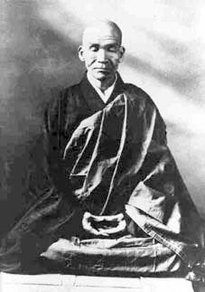Zazen
|
|
In Zen Buddhism, sitting meditation or zazen (Japanese: 座禅; literally "seated concentration") is a meditative discipline practitioners perform to calm the body and the mind and experience insight into the nature of existence. While the term originally referred to a sitting practice, it is now commonly used to refer to practices in any posture, such as walking.
In Japan, seated zazen is traditionally performed on a mat called a zabuton while sitting on a cushion called a zafu. The common positions used to sit on the zafu are:
- kekkafuza (full-lotus)
- hankafuza (half-lotus)
- Burmese (a cross-legged posture in which the ankles are placed together in front of the sitter)
- seiza (a kneeling posture using a bench or zafu)
In addition, it is not uncommon for modern practitioners to sit zazen in a chair, often with a wedge behind the lower back to help maintain the natural curve of the spine.
During zazen, the hands are folded together into a simple mudra over the belly. In many practices, one breathes from the hara (the center of gravity in the belly) and the eyelids are half-lowered, the eyes being neither fully open nor shut. (The latter practice has its origins in a superstition where those who close their eyes during meditation are said to be in the hungry ghost cave of Black Mountain.)
Long periods of zazen, usually performed in groups at a zendo (meditation hall), may alternate with periods of kinhin (walking meditation). The beginning of a zazen period is traditionally announced by ringing a bell three times (shijosho), and the end of a round by ringing the bell once (hozensho). Before and after sitting on the zafu, zen practitioners perform a gassho bow to the cushion, to fellow practitioners, and to the teacher.
Misconceptions about Zazen
To many in the West, zazen is an almost completely unfamiliar practice, which leaves an opportunity for many misconceptions to spring up. One common misconception is that zazen meditation entails the shutting out of all worldly stimulae in order to reach some special, superior state of mind. For example, in the film Crouching Tiger, Hidden Dragon, the character Li Mu Bai (李慕白) (played by Chow Yun Fat) describes reaching a frame of mind during meditation which is "pure light". While the zazen experience is inherently different for each practitioner, and such phenomena are not at all out of the question, such states of mind are not the goal of zazen.
See also
Further reading
- John Daishin Buksbazen, Peter Matthiessen (Foreword). (2002) Zen Meditation in Plain English. Wisdom Publications. ISBN 0-86-171316-8.

